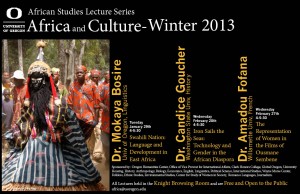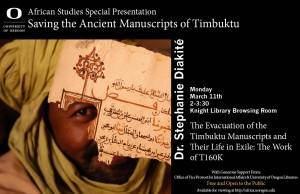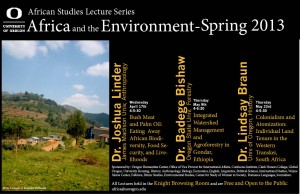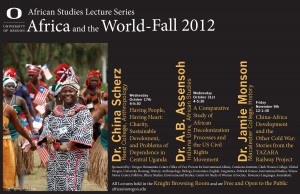African Studies Lecture Series 2012-2013
African Studies Lecture Series 2012-2013
Wed, October 17, 2012. 4-5:30 pm – Dr. China Scherz, Anthropology, Reed College
“Having People, Having Heart: Charity, Sustainable Development, and Problems of Dependence in Central Uganda”
- Dr. Scherz is a medical anthropologist interested in development, ethics/morality and humanitarianism. Dr. Scherz received her PhD from UC-Berkeley in 2010, and has carried out research in both Uganda and Ireland.
- Watch the Video of Dr. Scherz’s Talk: http://media.uoregon.edu/channel/2012/10/23/african-studies-lecture-series-dr-china-scherz/
Wed, October 31, 2012. 4-5:30 pm. – Dr. A.B. Assensoh, African American and African Studies, Indiana University
“A Comparative Study of African Decolonization Processes and the US Civil Rights Movement”.
- Dr. Assensoh’s talk provides a comparison of the leadership of the two movements and processes, bringing African American and African political and social histories in contact. As a historian and Professor Emeritus at Indiana University, he has been affiliated with IU’s African American and African Diaspora Department for many years, and has published books across African and Africa-American Studies (Rev. Dr. Martin Luther King, Jr., and America’s Quest for Racial Integration, African Military History and Politics, 1900-Present, and African Political Leadership). He is currently working on a new manuscript about Malcolm X, which will be co-authored with his wife, Dr. Yvette Alex-Assensoh.
- Watch the Video of Dr. Assensoh’s Talk: http://media.uoregon.edu/channel/2012/11/13/a-comparative-study-of-african-decolonization-processes-and-the-us-civil-rights-movement/
Fri, November 9, 2012. 12-1.30 pm.– Dr. Jamie Monson, History, Macalester College
“China-Africa Development and the Other Cold War: Stories from the TAZARA Railway Project”
- Dr. Monson is currently conducting research on China-East Africa relations during the Cold War years. She is Professor of History at Macalester College. Past books have included Africa’s Freedom Railway: How a Chinese Development Project Changed Lives and Livelihoods in Tanzania (Indian University Press) and Women as Food Producers in Developing Countries (Crossroads). She has received funding from the NEH, ACLS, the Carnegie Foundation, Social Science Research Council, the Wissenschaftskolleg zu Berlin (Institute for Advanced Study), and the Fulbright-Hays program. She conducts research in Swahili, German, Spanish, French and Chinese.
Winter Quarter: Africa/Culture
Tue, January 29, 2013. 4-5.30 pm. – Dr. Mokaya Bosire, Linguistics, University of Oregon
“Swahili Nation: language & development in East Africa”
- Dr. Bosire is newly arrived at the UO, has his home in the Department of Linguistics and is responsible for all three years of Swahili instruction on campus. He received his Ph.D. in Anthropology and Linguistics from State University of New York, Albany and has conducted research in Kenya and the United States. His talk addresses what role Swahili plays in the holistic development of East Africa, focusing on the significance of the language for those from the Swahili Nation.
- Watch the video of Dr. Bosire’s talk:http://media.uoregon.edu/channel/2013/01/31/dr-mokaya-bosire-swahili-nation-language-development-in-east-africa/
Wed, February 20, 2013. 4-5.30 pm. – Dr. Candice Goucher, History, Washington State University
“Iron Sails the Seas: Technology and Gender in the African Diaspora”
- Dr. Candice Goucher is Professor of History at Washington State University and has conducted research in West Africa, the Caribbean, Mauritius, and the Northwest. She was trained as a historian and archaeologist, receiving a masters degree in art history & archaeology from Columbia University and a PhD in African History from UCLA. She has been active in writing texts on world history and in the production of films such as “The Blooms of Banjeli: Technology and Gender in West-African Iron-Making,” which won the Society for Visual Anthropology Award of Excellence. She is currently on the Board of Editors for the 9-volume Cambridge History of the World and she is writing a history of Caribbean food. You can read more about Dr. Goucher’s work at http://libarts.wsu.edu/history/faculty-staff/goucher.asp
- Watch the video of Dr. Goucher’s talk: http://media.uoregon.edu/channel/2013/02/22/candice-goucher-iron-sails-the-seas-technology-and-gender-in-the-african-diaspora/
Wed, February 27, 2013. 4-5.30 pm.– Dr. Amadou Fofana, French, Willamette University
“The Representation of Women in the Films of Ousmane Sembene”
- Dr. Fofana is Associate Professor of French at Willamette University. He received a Licence es Lettres and a Maîtrise in English from Cheikh Anta Diop University, Dakar, Senegal. He also received an MA in French Literature and Civilization from Michigan State University, and completed his Ph.D. in African Languages and Literature from University of Wisconsin, Madison. His research and teaching interests include French language and literature, Francophone literature and cultures, African languages, literature and films. He is the author of The Films of Ousmane Sembène: Discourse, Politics and Culture.
- Watch the video of Dr. Fofana’s talk: http://media.uoregon.edu/channel/2013/03/04/dr-amadou-fofana-the-representation-of-women-in-the-films-of-ousmane-sembene/
Special Presentation: Saving the Ancient Manuscripts of Timbuktu
Monday, March 11th, 2013. 2-3.30 pm. – Dr. Stephanie Diakité
“The Evacuation of the Timbuktu Manuscripts and Their Life in Exile: The Work of T160K”
- Dr. Diakité will tell the moving story of the evacuation of the private libraries and the national collection in Mali. She will also share the work she and Abdel Kader Haidara, co-implementor of the evacuation and curator of one of the largest private libraries in Timbuktu, have initiated to safeguard the patrimony in exile and to share its significant governance and conflict resolution content for the purpose of enduring peace in Mali. Dr. Diakité and Abdel Kader Haidara hope to work with people worldwide in research, conservation and governance fields to integrate the significant governance and conflict resolution knowledge in the manuscripts into the peace process in Mali in truly participative ways. They believe that given the opportunity, the manuscripts and the indigenous peace building knowledge they contain can enable Malians to find enduring solutions to the crises they are experiencing both in the north and in the south. Further, they believe that lessons learned from this process can be extended to other areas of persistent conflict in Africa for the purpose of enduring peace.
- Watch the video of Dr. Diakité’s talk: http://media.uoregon.edu/channel/2013/03/13/stephanie-diakite-the-evacuation-of-the-tumbuktu-manuscripts-and-their-life-in-exile-the-work-of-t160k/
Spring Quarter: Africa/Environment
Wed, April 17, 2013. 4-5.30 pm. – Dr. Joshua Linder, Anthropology, James Madison University
“Bushmeat and Palm Oil: Eating Away African Biodiversity, Food Security, and Livelihoods”
- Dr. Joshua Linder is a primatologist in the Department of Sociology and Anthropology at James Madison University. His research examines the consequences of defaunation for plant and animal communities and explores how humans perceive and become motivated to protect their natural environment. His broad research interests include primate ecology and conservation, hunting in the tropics and the bushmeat trade, protected area management, and oil palm and land grabbing. He serves as a Board Member of, and scientific advisor to SAVE Wildlife Conservation Fund on their campaign against the development of an oil palm plantation in Cameroon by an American agribusiness company.
- Linder earned his Ph.D. from the Graduate Center of the City University of New York, and has published in journals such as the American Journal of Physical Anthropology and Biological Conservation. His research takes place in Korup National Park in Cameroon, where he has been studying primate ecology and conservation for the past decade. Much of his research has focused on bushmeat hunting (hunting for wild meat) and its effects on animal populations and forest regeneration.
Thur, May 9, 2013. 4-5.30 pm. – Dr. Badege Bishaw, Forest Ecosystems and Society, OSU
“Integrated Watershed Management and Agroforestry to Improve Livelihoods of Smallholder Farmers in Gondar, Ethiopia”
- Dr. Bishaw is a part of the Department of Forest Ecosystems & Society at Oregon State University and conducts research related to agroforestry and social forestry, riparian management of agricultural lands, and international forestry. He has participated in research and program development in South Africa, Ethiopia and southern Africa (Malawi, Mozambique and Zambia). These projects have variously addressed food security, watershed management, poverty alleviation and land degradation across the African continent. Dr. Bishaw was educated in Africa, Europe and the United States, and has over 25 years of experience in forestry, natural resources and agriculture education, research, outreach and administration. He received his Ph.D. from Oregon State University in Forest Resources in 1993, and an MS in Tropical Forestry from the University of Dresden, Germany in 1985, and a B.Sc. in Plant Sciences from Addis Ababa University, Ethiopia in 1979.
Tues, May 21, 2013. 4-5.30 pm.– Dr. Lindsay Braun, History, University of Oregon
“Colonialism and Atomization: Individual Land Tenure in the Western Transkei, South Africa,
